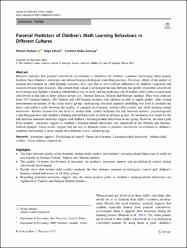Please use this identifier to cite or link to this item:
https://hdl.handle.net/20.500.11779/1900| Title: | Parental Predictors of Children’s Math Learning Behaviours in Different Cultures |
| Authors: | Selçuk, Bilge Kisbu-Sakarya, Yasemin Niehues, Wenke |
| Keywords: | Psychological control Learning-related behaviour Cross-cultural comparison Mother-child conflict Autonomy support Parent involvement |
| Publisher: | Springer |
| Source: | Niehues, W., Selcuk, B., & Kisbu-Sakarya, Y. (2022). Parental Predictors of Children’s Math Learning Behaviours in Different Cultures. Journal of Child and Family Studies. https://doi.org/10.1007/s10826-022-02501-z? |
| Abstract: | Research indicates that parental schoolwork involvement is beneficial for students' academic functioning when parents facilitate their children's autonomy and refrain from psychological controlling practices. However, effects of the quality of parental involvement on child learning outcomes may vary due to cross-cultural differences in children's appraisal and reaction towards these practices. The current study aimed to investigate the link between the quality of parental schoolwork involvement and children's learning-related behaviours in math, and the mediating role of mother-child conflict around math schoolwork in this link in three cultural groups (i.e., German-Turkish, Turkish and German families). Data were collected from 107 German-Turkish, 426 Turkish and 140 German mothers with children in fifth to eighth grades. After testing measurement invariance of the scales across groups, multi-group structural equation modelling was used to examine the direct and indirect paths between the quality of parental involvement, mother-child conflict and child learning-related behaviours. Results showed that the level of mother-child conflict mediated the link between mothers' psychologically controlling practices and children's learning-related behaviours in math in all three groups. No mediation was found for the link between maternal autonomy support and children's learning-related behaviours in any group. However, the direct path from mothers' autonomy support to children's learning-related behaviours was significant in the Turkish and German-Turkish samples. These results suggest that the role of different forms of parental schoolwork involvement in children's academic functioning is more similar than different across cultural groups. |
| URI: | https://doi.org/10.1007/s10826-022-02501-z https://hdl.handle.net/20.500.11779/1900 |
| ISSN: | 10621024 |
| Appears in Collections: | Psikoloji Bölümü Koleksiyonu Scopus İndeksli Yayınlar Koleksiyonu / Scopus Indexed Publications Collection WoS İndeksli Yayınlar Koleksiyonu / WoS Indexed Publications Collection |
Files in This Item:
| File | Description | Size | Format | |
|---|---|---|---|---|
| s10826-022-02501-z (1).pdf | Full Text - Article | 936.2 kB | Adobe PDF |  View/Open |
CORE Recommender
Sorry the service is unavailable at the moment. Please try again later.
Items in GCRIS Repository are protected by copyright, with all rights reserved, unless otherwise indicated.